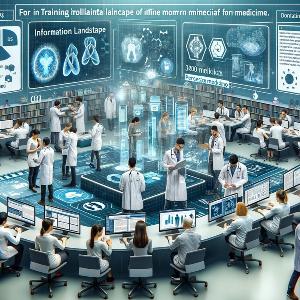CORE TP C07/TP A03


Generic and domain-specific critical online reasoning Task-solving processes and strategies of students and their development in the course of studies in four domains (economics, medicine, physics, sociology).
Development of domain-specific critical online reasoning (DOM-COR) in medical students in the course of preclinical studies.
The aim of the project is to investigate the influence of digital media and online information environments on student learning in more detail. In doing so, the solution strategies for tasks are analyzed, especially in the context of critical online reasoning (COR) and domain-specific knowledge. By recording eye movements and interviews, the strategies of successful and less successful students will be identified and developed. The long-term goal is to develop effective teaching methods and design new COR tasks that support and improve learning.
The project addresses the challenge of adequately training medical students for the information landscape of modern medicine, especially in the context of data-intensive precision medicine. Specifically, the development of online critical reasoning (COR) skills in medical school is crucial to ensure that future physicians are able to make informed decisions and provide high-quality medical care.
This project is about the essential necessity and importance of digital media and online information environments for student learning. To better understand these influences, eye-tracking and interviews will be used to analyze students' task-solving strategies. Previous research shows that these strategies vary between successful and less successful students. C07 focuses on identifying and developing these strategies, particularly in the context of online critical reasoning (COR) and domain-specific knowledge. It examines how different features of internet information influence the problem-solving process. The study records eye movements and interviews of students working on GEN and DOM COR tasks. The data will be analyzed to understand the role of solution strategies and domain knowledge. This will be used to develop effective teaching methods and design new COR tasks. The results will also provide information about reading behavior on web pages.
In order to promote these skills effectively, the sub-project (A03) is developing a set of instruments that will make it possible to record and analyze the domain-specific COR skills (DOM-COR) of medical students. This includes the examination of three cognitive facets: the ability to obtain information online, the critical evaluation of information and the ability to engage in evidence-based argumentation and synthesis of information.
A longitudinal study with a sample of 300 medical students and a comparison group of 300 physics students will be conducted to investigate the influence of the curriculum and other factors on the development of DOM-COR. Different courses and activities in the study will be taken into account, as well as individual learning prerequisites and interactions with specific characteristics of DOM-COR tasks or online materials.
The data generated will not only provide a deeper understanding of the development of DOM-COR skills, but will also be used to develop effective interventions to promote these skills. These findings will be used in a second phase of research to improve teaching methods in undergraduate medical education, thereby improving patient safety and the quality of medical care.
Subproject of FOR 5404: Critical Thinking in Online Learning Environments in Higher Education (CORE)